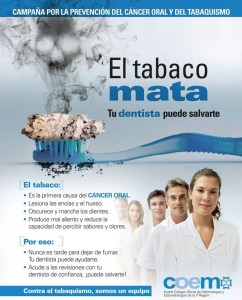Smoking is the leading cause of oral cancer in contemporary society, and this is one of the countless reasons why an experienced dentist can advise you on how to overcome oral cancerThis is something that many people have been grateful for in recent times thanks to early diagnosis of the disease.

How does tobacco affect my mouth and teeth?
Patients in the Region of Murcia are well aware of the effects that smoking has on their masticatory apparatus, but, just in case, we are going to review them today with the help of the campaign that has started the Official College of Odontologists and Stomatologists of the Community of Madrid:
- Tobacco multiplies the chances of developing oral cancer
- Tobacco damages your gums and the bone that supports your teeth.
- Tobacco darkens the colour of your teeth, worsening your overall aesthetics.
- Tobacco causes bad breath or halitosis
- Tobacco reduces your ability to distinguish tastes (and smells).

How can I quit smoking?
Consult your dentist, he or she will be able to suggest different alternatives for you to quit smoking, reduce your dependence on tobacco and, in short, improve not only your oral health but also your general physical condition: by quitting smoking you will breathe better and enjoy a better quality of life.
Which products can I use?
One of the products most often recommended by dentists is Niquitínan anti-tobacco drug based on Nicotine Replacement Therapy, in which the nicotine in tobacco is replaced by another nicotine, provided through tablets that the person who wants to stop smoking takes according to the guidelines given by his or her dentist.

In this way, we avoid nicotine dependence, since our body receives it by another route, and we avoid all the toxicity of tobacco smoke, until the patient has no desire to smoke and, from then on, they can reduce the number of Niquitin tablets as recommended by their dentist.
What is the best way to quit smoking?
There is really no infallible method, so dentists often propose different combined treatments:
- Behavioural support from a qualified healthcare professional, such as a dentist or dental hygienist
- Chemical support through medication to help overcome nicotine addiction
- Physical exercise and activities that help us to release tension and stress to reduce dependence on tobacco for this reason.


